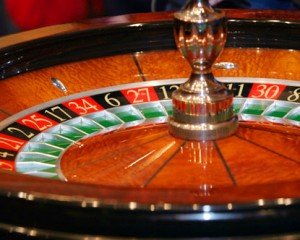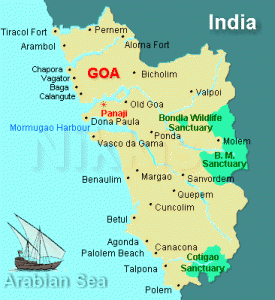Are you sure you are playing a game and not gambling? The difference between gaming and gambling is quite simple: Gambling that is legalised is regarded as a game. For instance, betting on Cricket match results is considered as a gambling activity in India while the same is legal in UK.
 At present Casinos are allowed in only two Indian states: Goa and Sikkim. In US, the situation is reverse with almost all the states having casinos. The word Casino originally meant a public hall meant for dancing and singing, but by the second half of nineteenth century, it came to be associated with gaming and gambling. One of the best known Casinos in Monaco was set up as early as 1863. In US, the great depression paved the way for the industry with Nevada being the first state to ratify it as a source for state revenue. The economy of US cities like Las Vegas is presently being driven entirely by the Casino industry.
At present Casinos are allowed in only two Indian states: Goa and Sikkim. In US, the situation is reverse with almost all the states having casinos. The word Casino originally meant a public hall meant for dancing and singing, but by the second half of nineteenth century, it came to be associated with gaming and gambling. One of the best known Casinos in Monaco was set up as early as 1863. In US, the great depression paved the way for the industry with Nevada being the first state to ratify it as a source for state revenue. The economy of US cities like Las Vegas is presently being driven entirely by the Casino industry.
The world-wide revenue of this glamorous gambling industry is expected to grow to 180 billion USD by 2015 from 117.6 billion USD (2010) at an annual growth rate of 9.2%. In terms of regional revenues, the Asia-pacific region is expected to become the largest by 2015 with an annual growth rate of 18.3%, according to a PwC report. EMEA (Europe, Middle East and Africa) will be a slow growing market during this period with a CAGR of 2.4%.
|
Region |
Revenue in 2010
|
Rev. (exp) in 2015
|
Growth Rate
|
|
US
|
$57.5 bn
|
$73.3 bn
|
5 %
|
|
Asia Pacific
|
$34.3 bn
|
$79.3 bn
|
18.3%
|
|
EMEA
|
$16.3 bn
|
$18.3 bn
|
2.4%
|
|
Latin America
|
$3.8 bn
|
$5.6 bn
|
8.1%
|
|
Canada
|
$5.7 bn
|
$6.2 bn
|
1.8%
|
In the high growth Asia pacific region, casinos are largely being driven by two locations presently: Macau & Singapore. Macau with revenues of over $38 billion USD(2012), is today the largest single casino destination in the world. The successful completion of the Macau-Hong Kong bridge will further boost its revenue from this industry. The success of Macau has prompted the Chinese authorities to legalise casinos in the island of Hainan, which can emerge as a major centre in future. China so far does not allow gambling in any form, except two state owned lotteries, in the mainland. Singapore was a late entrant and legalised Casinos only in the year 2009, but has already grown significantly with revenue of nearly $6 billion USD. Philippines and Australia are the other two major players in this region.

In India, though online gambling is illegal under the Information Technology rules of 2011, little attempt has been made to control such activities. In the state of Goa, where casinos are allowed, this industry has contributed significantly in making it the richest Indian state with per capita GDP 2.5 times that of the national average. Furthermore, the depreciation of the Indian rupee with respect to the USD has also made gambling in India more lucrative for overseas tourists. The rupee has seen a sharp fall of about 20% in recent period, which implies a casino regular has 20% more value while playing in India as compared to its Asian counterparts, whose currencies have shown an appreciating trend. Delta Corp. – India’s only listed gaming company, which operates off-shore casinos in Goa has been posting impressive financial results on quarterly basis every year.
There are rising concerns about money laundering taking place in Goa which has fuelled the boom in the casino industry. In this regard, the state government is looking to implement KYC norms strictly and track the origin of the money inflow though little progress has been made so far. The casino owners have in the past also been accused of underreporting revenues in order to avoid taxes. At present, the revenue model for the government works in the following way:
- In case of Goa, operators have to pay 10% of the total value of chips sold or money receipts along with Rs. 5 crore per gaming machine for off-shore casinos.
- In case of Sikkim, casino operators are charged Rs. 5 crore as five year license fee along with 10% (15% from year 3 onwards) of total revenue or Rs. 1 crore per year, whichever is more.
The state of Punjab has also proposed setting up a 24 hour open casino as part of the Punjab Turf Club project in Mattewara district near Ludhiana. The PTC also includes a Turf Club (with betting on Horse races) and a five star hotel and is spread across 1400 acres of land. The Punjab government is expected to follow the Sikkim model.
Zynga, the social gaming giant behind successful titles like Farmville and Cityville, decided to foray into online casinos amid falling revenues and growing concerns about its business model. The casino business is today a highly technology driven industry and other gaming portals are also expected to follow suit. While there is little doubt about the scope of revenue in this industry, yet its social implications should not be ruled out. However, in the age of globalisation, putting a ban on gambling or casinos will merely increase black money circulation rather than curbing it. On the other hand, legalising it will boost revenues along with tourism. The choice is simple though: It is for the government to decide.
You might like reading:

Interview with an author who travelled around the globe !
Have you ever wanted to travel overseas? How about travelling across four different continents in a year and encountering countless memorable experiences? Sounds fascinating, Right! It gives us immense pride to have with us Mr. Adam Shepard, the author of One Year Lived, who achieved precisely the same in a journey that ranged from countries as diverse as the beautiful […]

IdeasClash 2.0- Business article writing competition
1. The contest is open to Indian nationals only. 2. The article should be original and free from any form of plagiarism. If found to have plagiarism, the article will be immediately disqualified from the contest. All sources and references for data should be properly mentioned.The topics for article submission are: i.Economic analysis of any Euro zone country excluding […]






























